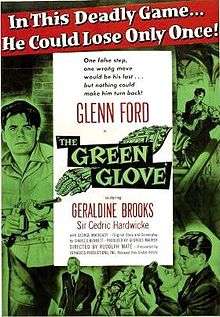The Green Glove
| The Green Glove | |
|---|---|
 Theatrical release poster | |
| Directed by | Rudolph Maté |
| Produced by | Georges Maurer |
| Screenplay by | Charles Bennett |
| Story by | Charles Bennett |
| Starring |
Glenn Ford Geraldine Brooks Sir Cedric Hardwicke |
| Narrated by | John Dehner |
| Music by | Joseph Kosma |
| Cinematography | Claude Renoir |
| Edited by |
Lola Barache Louis Sackin |
Production company |
Benagoss Productions Union Générale Cinématographique |
| Distributed by | United Artists |
Release dates |
|
Running time | 89 minutes |
| Country | United States |
| Language | English |
The Green Glove (aka The White Road) is a 1952 French/American international co-production film noir directed by Rudolph Maté and starring Glenn Ford, Geraldine Brooks, Sir Cedric Hardwicke and George Macready.[1]
Plot
Mike Blake (Glenn Ford) is an American paratrooper who travels to France after the end of World War II to try to recover a jewel-encrusted glove that had been stolen from a country church during the war. His quest leads him to a beautiful young tour guide (Geraldine Brooks), and a Nazi collaborator (George Macready) whom he had fought during the war.
Cast
- Glenn Ford as Michael 'Mike' Blake
- Geraldine Brooks as Christine 'Chris' Kenneth
- Sir Cedric Hardwicke as Father Goron
- George Macready as Count Paul Rona
- Gaby André as Gaby Saunders
- Jany Holt as The Countess
- Roger Tréville as Police Insp. Faubert
- Georges Tabet as Jacques Piotet
- Meg Lemonnier as Madame Piotet
- Paul Bonifas as Inspector
- Jean Bretonnière as Singer
Background
The movie was shot mostly on location in southern France and Monaco.[2] It was based on actions that took place during Operation Dragoon.
Soundtrack
L'Amour est parti
Written by Joseph Kosma
Lyrics by Henri Bassis
Sung by Juliette Gréco
Romance
Written by Joseph Kosma
Lyrics by Henri Bassis
Sung by Juliette Gréco
Reception
Critical response
When the film was first released in 1952, film critic Bosley Crowther expected a first-rate production given that, the screenplay writer, Charles Bennett, had written films "of a high order" such as The 39 Steps. However, he found The Green Glove "is not in that echelon, but is merely a standard chase after a medieval, bejewelled gauntlet filched from a rural French church." He continued, "... but the tale spun is minor-league melodrama. Glenn Ford is largely listless as the paratrooper who clashed with a collaborator-art dealer during the war ..."[3]
Film critic Dennis Schwartz was disappointed in the film, yet praised the work of Glenn Ford. He wrote, "Rudolph Maté (D.O.A./Union Station/Miracle in the Rain) directs this standard thriller, that has a few twists but bogs down over too many hysterical melodramatic moments and the unbelievability of the characters and story line. It's weakly scripted by Charles Bennett and is based on his novel ... There's a good story here, but too bad it wasn't told convincingly and the featured sudden romance came about so quickly that it was not possible for me to believe it; nor was I able to find the suspense story even close to the way a top-notch director like Hitchcock would have built up the suspense and made things more exciting (If not convinced then perhaps check out The 39 Steps, directed by Hitchcock and also written by Bennett!). The former cinematographer Maté can't keep things real and all the plot points seem nothing short of schematic. But Glenn Ford is in it, and he's so good in these type of adventure roles that he at least keeps the flawed pic entertaining."[4]
Comic book adaption
- Eastern Color Movie Love #15 (June 1952)[5]
See also
References
- ↑ The Green Glove at the American Film Institute Catalog.
- ↑ AFI. Ibid.
- ↑ Crowther, Bosley. The New York Times, film review, April 24, 1952. Accessed: July 25, 2013.
- ↑ Schwartz, Dennis. Ozus' World Movie Reviews, film review, January 23, 2011. Accessed: July 25, 2013.
- ↑ "Movie Love #15". Grand Comics Database.
External links
- The Green Glove at the American Film Institute Catalog
- The Green Glove at the Internet Movie Database
- The Green Glove at AllMovie
- The Green Glove at the TCM Movie Database
- The Green Glove is available for free download at the Internet Archive
- The Green Glove opening titles on YouTube
- The Green Glove complete film on YouTube (public domain)